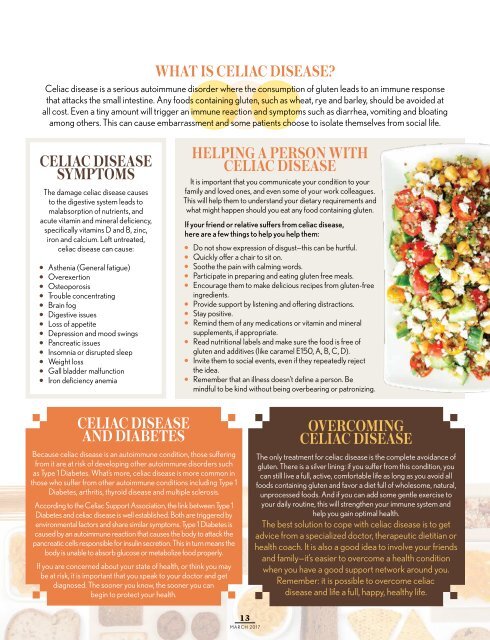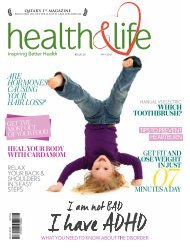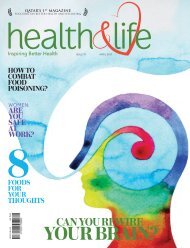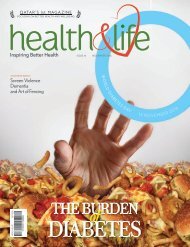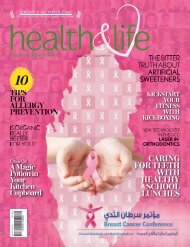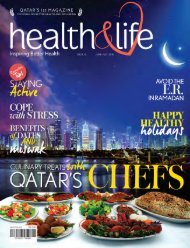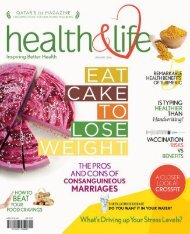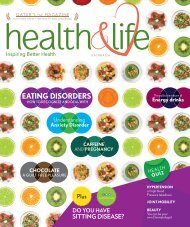Health & Life Magazine March 2017
Health & Life Magazine March 2017 www.health-n-life.com
Health & Life Magazine March 2017
www.health-n-life.com
Create successful ePaper yourself
Turn your PDF publications into a flip-book with our unique Google optimized e-Paper software.
WHAT IS CELIAC DISEASE?<br />
Celiac disease is a serious autoimmune disorder where the consumption of gluten leads to an immune response<br />
that attacks the small intestine. Any foods containing gluten, such as wheat, rye and barley, should be avoided at<br />
all cost. Even a tiny amount will trigger an immune reaction and symptoms such as diarrhea, vomiting and bloating<br />
among others. This can cause embarrassment and some patients choose to isolate themselves from social life.<br />
CELIAC DISEASE<br />
SYMPTOMS<br />
The damage celiac disease causes<br />
to the digestive system leads to<br />
malabsorption of nutrients, and<br />
acute vitamin and mineral deficiency,<br />
specifically vitamins D and B, zinc,<br />
iron and calcium. Left untreated,<br />
celiac disease can cause:<br />
Asthenia (General fatigue)<br />
Overexertion<br />
Osteoporosis<br />
Trouble concentrating<br />
Brain fog<br />
Digestive issues<br />
Loss of appetite<br />
Depression and mood swings<br />
Pancreatic issues<br />
Insomnia or disrupted sleep<br />
Weight loss<br />
Gall bladder malfunction<br />
Iron deficiency anemia<br />
HELPING A PERSON WITH<br />
CELIAC DISEASE<br />
It is important that you communicate your condition to your<br />
family and loved ones, and even some of your work colleagues.<br />
This will help them to understand your dietary requirements and<br />
what might happen should you eat any food containing gluten.<br />
If your friend or relative suffers from celiac disease,<br />
here are a few things to help you help them:<br />
Do not show expression of disgust—this can be hurtful.<br />
Quickly offer a chair to sit on.<br />
Soothe the pain with calming words.<br />
Participate in preparing and eating gluten free meals.<br />
Encourage them to make delicious recipes from gluten-free<br />
ingredients.<br />
Provide support by listening and offering distractions.<br />
Stay positive.<br />
Remind them of any medications or vitamin and mineral<br />
supplements, if appropriate.<br />
Read nutritional labels and make sure the food is free of<br />
gluten and additives (like caramel E150, A, B, C, D).<br />
Invite them to social events, even if they repeatedly reject<br />
the idea.<br />
Remember that an illness doesn’t define a person. Be<br />
mindful to be kind without being overbearing or patronizing.<br />
CELIAC DISEASE<br />
AND DIABETES<br />
Because celiac disease is an autoimmune condition, those suffering<br />
from it are at risk of developing other autoimmune disorders such<br />
as Type 1 Diabetes. What’s more, celiac disease is more common in<br />
those who suffer from other autoimmune conditions including Type 1<br />
Diabetes, arthritis, thyroid disease and multiple sclerosis.<br />
According to the Celiac Support Association, the link between Type 1<br />
Diabetes and celiac disease is well established. Both are triggered by<br />
environmental factors and share similar symptoms. Type 1 Diabetes is<br />
caused by an autoimmune reaction that causes the body to attack the<br />
pancreatic cells responsible for insulin secretion. This in turn means the<br />
body is unable to absorb glucose or metabolize food properly.<br />
If you are concerned about your state of health, or think you may<br />
be at risk, it is important that you speak to your doctor and get<br />
diagnosed. The sooner you know, the sooner you can<br />
begin to protect your health.<br />
OVERCOMING<br />
CELIAC DISEASE<br />
The only treatment for celiac disease is the complete avoidance of<br />
gluten. There is a silver lining: if you suffer from this condition, you<br />
can still live a full, active, comfortable life as long as you avoid all<br />
foods containing gluten and favor a diet full of wholesome, natural,<br />
unprocessed foods. And if you can add some gentle exercise to<br />
your daily routine, this will strengthen your immune system and<br />
help you gain optimal health.<br />
The best solution to cope with celiac disease is to get<br />
advice from a specialized doctor, therapeutic dietitian or<br />
health coach. It is also a good idea to involve your friends<br />
and family—it’s easier to overcome a health condition<br />
when you have a good support network around you.<br />
Remember: it is possible to overcome celiac<br />
disease and life a full, happy, healthy life.<br />
13<br />
MARCH <strong>2017</strong>


